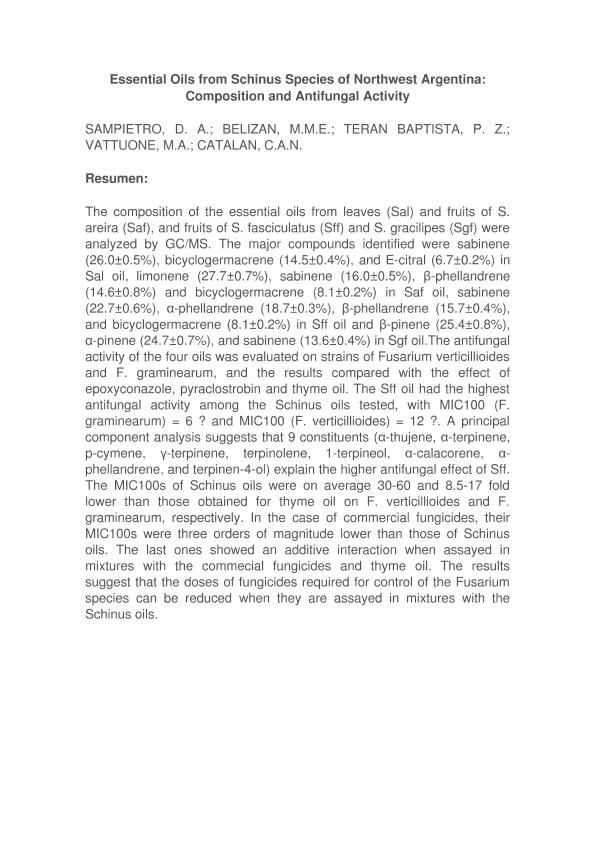Mostrar el registro sencillo del ítem
dc.contributor.author
Sampietro, Diego Alejandro

dc.contributor.author
Belizan, M. M. E.
dc.contributor.author
Terán Baptista, Zareath Pamela

dc.contributor.author
Catalan, Cesar Atilio Nazareno

dc.date.available
2022-07-21T14:27:15Z
dc.date.issued
2014-11
dc.identifier.citation
Sampietro, Diego Alejandro; Belizan, M. M. E.; Terán Baptista, Zareath Pamela; Catalan, Cesar Atilio Nazareno; Essential Oils from Schinus Species of Northwest Argentina: Composition and Antifungal Activity; Natural Products; Natural Product Communications; 9; 9; 11-2014
dc.identifier.issn
1934-578X
dc.identifier.uri
http://hdl.handle.net/11336/162794
dc.description.abstract
The composition of the essential oils from leaves (Sal) and fruits of S. areira (Saf), and fruits of S. fasciculatus (Sff) and S. gracilipes (Sgf) were analyzed by GC/MS. The major compounds identified were sabinene (26.0±0.5%), bicyclogermacrene (14.5±0.4%), and E-citral (6.7±0.2%) in Sal oil, limonene (27.7±0.7%), sabinene (16.0±0.5%), β-phellandrene (14.6±0.8%) and bicyclogermacrene (8.1±0.2%) in Saf oil, sabinene (22.7±0.6%), α-phellandrene (18.7±0.3%), β-phellandrene (15.7±0.4%), and bicyclogermacrene (8.1±0.2%) in Sff oil and β-pinene (25.4±0.8%), α-pinene (24.7±0.7%), and sabinene (13.6±0.4%) in Sgf oil.The antifungal activity of the four oils was evaluated on strains of Fusarium verticillioides and F. graminearum, and the results compared with the effect of epoxyconazole, pyraclostrobin and thyme oil. The Sff oil had the highest antifungal activity among the Schinus oils tested, with MIC 100 (F. graminearum) = 6 ‰ and MIC 100 (F. verticillioides) = 12 ‰. A principal component analysis suggests that 9 constituents (α-thujene, α-terpinene, p- cymene, γ-terpinene, terpinolene, 1-terpineol, α-calacorene, α-phellandrene, and terpinen-4-ol) explain the higher antifungal effect of Sff. The MIC 100 s of Schinus oils were on average 30-60 and 8.5-17 fold lower than those obtained for thyme oil on F. verticillioides and F. graminearum, respectively. In the case of commercial fungicides, their MIC 100 s were three orders of magnitude lower than those of Schinus oils. The last ones showed an additive interaction when assayed in mixtures with the commecial fungicides and thyme oil. The results suggest that the doses of fungicides required for control of the Fusarium species can be reduced when they are assayed in mixtures with the Schinus oils.
dc.format
application/pdf
dc.language.iso
eng
dc.publisher
Natural Products

dc.rights
info:eu-repo/semantics/openAccess
dc.rights.uri
https://creativecommons.org/licenses/by-nc-sa/2.5/ar/
dc.subject
SCHINUS
dc.subject
FUSARIUM
dc.subject
ESSENTIAL OILS
dc.subject.classification
Micología

dc.subject.classification
Ciencias Biológicas

dc.subject.classification
CIENCIAS NATURALES Y EXACTAS

dc.subject.classification
Química Orgánica

dc.subject.classification
Ciencias Químicas

dc.subject.classification
CIENCIAS NATURALES Y EXACTAS

dc.subject.classification
Otras Ciencias Agrícolas

dc.subject.classification
Otras Ciencias Agrícolas

dc.subject.classification
CIENCIAS AGRÍCOLAS

dc.title
Essential Oils from Schinus Species of Northwest Argentina: Composition and Antifungal Activity
dc.type
info:eu-repo/semantics/article
dc.type
info:ar-repo/semantics/artículo
dc.type
info:eu-repo/semantics/publishedVersion
dc.date.updated
2022-07-04T20:01:12Z
dc.journal.volume
9
dc.journal.number
9
dc.journal.pais
Estados Unidos

dc.journal.ciudad
Westerville, Ohio
dc.description.fil
Fil: Sampietro, Diego Alejandro. Universidad Nacional de Tucumán. Facultad de Bioquímica, Química y Farmacia. Instituto de Estudios Vegetales. Cátedra de Fitoquímica; Argentina. Consejo Nacional de Investigaciones Científicas y Técnicas. Centro Científico Tecnológico Conicet - Tucumán; Argentina
dc.description.fil
Fil: Belizan, M. M. E.. Universidad Nacional de Tucumán. Facultad de Bioquímica, Química y Farmacia. Instituto de Estudios Vegetales. Cátedra de Fitoquímica; Argentina
dc.description.fil
Fil: Terán Baptista, Zareath Pamela. Universidad Nacional de Tucumán. Facultad de Bioquímica, Química y Farmacia. Instituto de Estudios Vegetales. Cátedra de Fitoquímica; Argentina. Consejo Nacional de Investigaciones Científicas y Técnicas. Centro Científico Tecnológico Conicet - Tucumán; Argentina
dc.description.fil
Fil: Catalan, Cesar Atilio Nazareno. Universidad Nacional de Tucuman. Facultad de Bioquímica, Química y Farmacia. Instituto de Química Organica. Cátedra de Química Organica Ii; Argentina. Consejo Nacional de Investigaciones Científicas y Técnicas. Centro Científico Tecnológico Conicet - Tucumán; Argentina
dc.journal.title
Natural Product Communications

dc.relation.alternativeid
info:eu-repo/semantics/altIdentifier/url/https://journals.sagepub.com/doi/pdf/10.1177/1934578X1400900734
Archivos asociados
